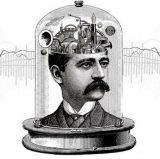First-year Seminar (FYSM) courses are smaller classes (with a maximum of 30 students) designed to give students the unique opportunity to discuss and research topics of interest in a core subject area.
While most university students have to wait until their third or fourth year of study before having the chance to participate in a more intimate seminar setting, as a Carleton University Bachelor of Arts student, the engaging seminar experience is available to you at the first-year level.
Fall 2021
 Instructor: Philippe-Antoine Hoyeck
Instructor: Philippe-Antoine Hoyeck
FYSM 1210 A: Special Topics in Philosophy
[0.5 credit] Fall 2021
Thursdays, 4:30-6:00pm.
“Science Fiction and Philosophy”
This course introduces students to a range of themes in philosophy through the lens of science fiction. Students will be exposed to classic works of science fiction across a range of different media, including film, television, and literature. These will be used to illustrate key concepts, problems, and figures in the philosophical tradition.
Philosophical themes discussed may include questions pertaining to selfhood and personal identity, the nature of the mind, the existence of free will, knowledge of the external world, the nature of the good life and the organization of a just society. No prior knowledge of either the philosophical tradition or the science fiction genre is required.
___________________________________________________________
 Instructor: Josh Redstone
Instructor: Josh Redstone
FYSM 1210 B: Special Topics in Philosophy
[0.5 credit] Fall 2021
Mondays and Wednesdays, 7:30-9:00pm.
“Minds and Machines”
Have you ever wondered what the mind is? Have you ever asked yourself: “Is my mind something immaterial and mysterious? Or, is it just a very complex machine, like a computer?” Philosophers have been fascinated by the mind since antiquity. Thinkers like Plato and Aristotle argued that thinking, perceiving, and acting – abilities which we attribute to the mind today – is the job of the rational soul. Approaching modernity, however, philosophers began to explore another possibility. They wondered whether the human being – and by extension, the mind – is a kind of natural machine. In this seminar, you will gain an understanding of the mind by considering classic philosophical works on the nature of minds and machines.

Our inquiry will start with ancient conceptions of the soul: an immaterial entity that is essentially you. We will then proceed to read the work of some modern materialist thinkers like Thomas Hobbes and Julien Offray de la Mettrie, who argued that the human being – and by extension the mind – is just a natural machine. We will also encounter thinkers whose position lies between these two, like René Descartes, who believed the body was an intricate machine controlled by the soul. As our survey reaches the 20th century, we will examine the works of figures like Alan Turing, Hilary Putnam, John Searle and Daniel Dennett, who approached the mind with the tools of philosophy in addition to those of computer science, neuroscience, and psychology. Throughout the seminar, questions intimately tied to the discussion about minds and machines will punctuate our search: can machines have free will? Is consciousness necessary for agency? What is special about artificial intelligence?
Winter 2021
 Instructor: Josh Redstone
Instructor: Josh Redstone
FYSM 1210 A: Special Topics in Philosophy
[0.5 credit] Winter 2022
Wednesdays and Fridays, 11:30am – 1:00 pm.
“Consciousness”
Have you ever wondered what the mind is? Have you ever asked yourself: “Is my mind something immaterial and mysterious? Or, is it just a very complex machine, like a computer?” Philosophers have been fascinated by the mind since antiquity. Thinkers like Plato and Aristotle argued that thinking, perceiving, and acting – abilities which we attribute to the mind today – is the job of the rational soul. Approaching modernity, however, philosophers began to explore another possibility. They wondered whether the human being – and by extension, the mind – is a kind of natural machine. In this seminar, you will gain an understanding of the mind by considering classic philosophical works on the nature of minds and machines.
Our inquiry will start with ancient conceptions of the soul: an immaterial entity that is essentially you. We will then proceed to read the work of some modern materialist thinkers like Thomas Hobbes and Julien Offray de la Mettrie, who argued that the human being – and by extension the mind – is just a natural machine. We will also encounter thinkers whose position lies between these two, like René Descartes, who believed the body was an intricate machine controlled by the soul. As our survey reaches the 20th century, we will examine the works of figures like Alan Turing, Hilary Putnam, John Searle and Daniel Dennett, who approached the mind with the tools of philosophy in addition to those of computer science, neuroscience, and psychology. Throughout the seminar, questions intimately tied to the discussion about minds and machines will punctuate our search: can machines have free will? Is consciousness necessary for agency? What is special about artificial intelligence?
___________________________________________________________
Instructor: Ken Ferguson
FYSM 1212 A: Special Topics in Philosophy
[0.5 credit] Winter 2022
Mondays and Wednesday, 10:00am – 11:30am.
“Contemporary Moral, Social, and Religious Issues”
The purpose of this course is to introduce students to ethics as a field of study and to examine in detail a number of difficult and controversial social and moral issues. In the first part of the course we will discuss issues concerning the general nature of morality. Does morality depend in some essential way on religion? Do the same moral standards apply universally, or is ethics relative to different societies or cultures? Does the morality of an act depend on its contribution to human happiness?
We will then turn to a range of different issues in social and applied ethics. These will involve issues of equality and social justice, human rights and discrimination, protecting the environment, and the impact of science and new technologies on society. Among the issues to be addressed are the following: What obligations do people in affluent countries have to help overcome global poverty? Should billionaires be abolished (through taxation)? To what extent do we have obligations toward animals and other living things? What are our moral obligations so far as global warming and climate change are concerned? What are the most harmful forms of discrimination in society today and what steps can be taken to address them? Should vaccination against Covid-19 and other serious diseases be mandatory?
Students should benefit from the course by improving their reading, writing and presentation skills, by acquiring the analytical tools needed to engage in serious discussion of social and moral issues, and by developing a greater sensitivity for, and awareness of, ethical issues. Course work will involve a combination of essays, presentations, and a take-home final exam.